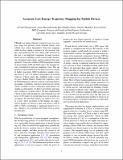Accurate, Low-Energy Trajectory Mapping for Mobile Devices
Author(s)
Thiagarajan, Arvind; Ravindranath, Lenin; Balakrishnan, Hari; Madden, Samuel R.; Girod, Lewis D.
DownloadMadden_Accurate low.pdf (4.413Mb)
OPEN_ACCESS_POLICY
Open Access Policy
Creative Commons Attribution-Noncommercial-Share Alike
Terms of use
Metadata
Show full item recordAbstract
CTrack is an energy-efficient system for trajectory mapping using raw position tracks obtained largely from cellular base station fingerprints. Trajectory mapping, which involves taking a sequence of raw position samples and producing the most likely path followed by the user, is an important component in many location-based services including crowd-sourced traffic monitoring, navigation and routing, and personalized trip management. Using only cellular (GSM) fingerprints instead of power-hungry GPS and WiFi radios, the marginal energy consumed for trajectory mapping is zero. This approach is non-trivial because we need to process streams of highly inaccurate GSM localization samples (average error of over 175 meters) and produce an accurate trajectory. CTrack meets this challenge using a novel two-pass Hidden Markov Model that sequences cellular GSM fingerprints directly without converting them to geographic coordinates, and fuses data from low-energy sensors available on most commodity smart-phones, including accelerometers (to detect movement) and magnetic compasses (to detect turns). We have implemented CTrack on the Android platform, and evaluated it on 126 hours (1,074 miles) of real driving traces in an urban environment. We find that CTrack can retrieve over 75% of a user's drive accurately in the median. An important by-product of CTrack is that even devices with no GPS or WiFi (constituting a significant fraction of today's phones) can contribute and benefit from accurate position data.
Date issued
2011-03Department
Massachusetts Institute of Technology. Computer Science and Artificial Intelligence Laboratory; Massachusetts Institute of Technology. Department of Electrical Engineering and Computer ScienceJournal
Proceedings of the 8th USENIX Symposium on Networked Systems Design and Implementation, NSDI 2011
Publisher
USENIX Association
Citation
Thiagarajan, Arvind et al. "Accurate, Low-Energy Trajectory Mapping for Mobile Devices." Proceedings of the 8th USENIX Symposium on Networked Systems Design and Implementation, NSDI 2011, March 30-April 1, 2-011, Boston, Mass.
Version: Author's final manuscript